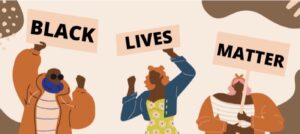
George Floyd. Rayshard Brooks. Elijah McClain. Breonna Taylor. Armaud Arbery. The list goes on.
The Black Lives Matter (BLM) movement has been galvanized by today’s social justice movement. Now is not the time for the most privileged to ignore conflict so that they can continue to escape confrontation, as tensions intensify within our communities.
An “ally” is a dominant group that works to end injustice by supporting and advocating for people of marginalized and oppressed communities. While this philosophy may sound admirable, in essence, it has only contributed to injustice.
The silence and negligence of “well-meaning white people” — who may have not committed the criminal act, but are guilty of turning the other cheek — have cost so many black lives.
Unconsciously and subconsciously, white people promote bigotry to the extent that the mere act of announcing “Black Lives Matter” is seen as a political stance rather than an undeniable fact.
On June 2, 2020, #BlackoutTuesday was the most direct and public display of this global “call to action.” About 14.6 million black squares flooded Instagram feeds as genuine commitments and calls to action were overshadowed by a shallow social media trend.
But when opportunities arise where companies can pledge to play a pivotal role in the fight against systemic racism, they often tend to hide in the shadows.
Fashion Nova, for instance, only joined in the #BLM conversation after mounds of public criticism. They provided declarations revealing their contributions to the Know Your Rights Camps, Black Lives Matter, and the NAACP Security and Education funds.
When announcing their donations Fashion Nova said, “our actions speak louder than our words.”
However, it does not seem like their thoughts, let alone their actions, have spoken in the months following this announcement. If you look at Fashion Nova’s Instagram account and its 600+ photos since June 2, there has not been a single mention of anti-Black racism.
And while these acts are encouraged, these companies are confined to an “optical allyship.”
“This is an allyship that only serves at the surface level to platform the ‘ally,’ it makes a statement but doesn’t go beneath the surface and is not aimed at breaking away from the systems of power that oppress,” explained Latham Thomas, who invented the phrase. “True allyship is about building trust, being consistent, standing up, speaking up, recognizing the struggle, and carrying some of the weight.”
As I watched celebrities exploit the suffering of our society for likes and comments, it was obvious to me that these minimal tweets on #BlackoutTuesday and the days following proved that their advocacy and empathy starts and ends on social media, well at least publicly.
White people are indeed playing hero and villain in the trauma of Black lives. Their option to care or not is the very definition of white privilege.
Again and again, we have seen the same pattern: a tragic event takes place, non-Black people exude pain, release meaningless statements, donate money, and maybe post some resources, and then they are back to total silence.
And with all the issues we face in America, being a bystander is not an option in helping combat injustice.
It takes more than showing solidarity on a black screen, holding posters of Black Lives Matter and uploading useful infographics to combat oppression. To be a true ally, you must continue to educate yourself, objectively analyze your position in society as a privileged person and, if you have the means, help provide financial support to marginalized groups.